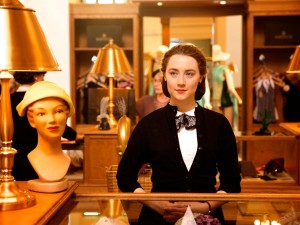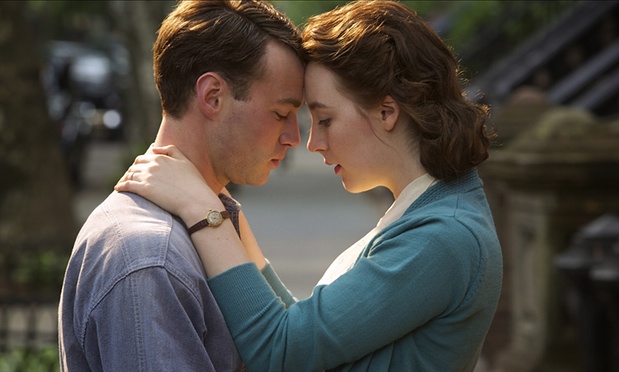Andrew Rostan was a film student before he realized that making comics was his horrible destiny, and he’s never shaken his love of cinema. Every week, he’ll opine on current pictures or important movies from the past.
This piece goes up the day after Thanksgiving. Chances are, fair reader, you’re home with your relatives or your relatives have come to you. There’s a few lazy days following the turkey consumption and people may feel like seeing a movie. However, almost every choice has pitfalls. You need a film that won’t provoke a rant from your relations, and doesn’t require watching three previous films, and isn’t from a franchise you find archaic, and is still new enough that people aren’t sick of hearing about it.
Brooklyn is 2015’s grand prize winner for “movie to see with your older relatives.” It is a movie with nothing objectionable in it. It is also beautifully made and a serious Oscar contender thanks to the figure at its center.
A 1950s Throwback
Based on the 2009 novel by Colm Toibin (a very good author whose book The Master is one I would highly recommend), Brooklyn tells the story of Eilis Lacey, a very young Irishwoman who emigrates to New York in 1952. There’s a scene early on in which Eilis’s housemates discuss seeing The Quiet Man, and Brooklyn could have played on a double bill with John Ford’s masterpiece back in the day; so much so that the scene of old widowed Irish emigrants having Christmas corned beef and Guinness while a tenor sings is both expected and still heartstring-tugging.
Screenwriter Nick Hornby plays down the more witty and intense sides of his style and places extra emphasis on the sentimentality that runs through his own best work. Brooklyn is populated by unfailingly good-hearted, understanding, and sympathetic figures, the sole exception being the gossipy crone who owns the grocery store in Eilis’s hometown. The story has nothing violent or terrifying, no obscene language, and no whiffs of impropriety, and Hornby clearly has gentle fun utilizing mild Irish, Italian, and Catholic stereotypes.
Director John Crowley, who earlier this year filmed part of the much-maligned second season of True Detective, now works with his production team to make a film that could have come from Douglas Sirk or Jean Negulesco, full of brightly lit scenes and saturated colors, wide shots of urban landscapes, and a fixation on the female body and the material possessions—clothes, make-up, furnishings—that accompanied a “traditional” female life in an age before second-wave feminism. Michael Brook adds a score full of evocative Gaelic-tinged strings.
Indeed, the film’s only concession to 2015 is a clear premarital sex scene which may not have passed muster back in the day.
All of the above may not be a convincing argument to go see Brooklyn, but Crowley, Hornby, and company operate at the height of their crafts to create their ideal melodrama. And they collaborate with one person who singlehandedly lifts Brooklyn from “decent” to “really truly good.” That person is their leading lady, Saorise Ronan.
An Iron-Willed Adoration
 Ronan turned 21 this year, which makes Brooklyn her first grown-up starring role, and all the gifts she displayed from her Atonement debut onward now reveal their mature fruition. She never emotes or overplays the physical and emotional journey Eilis goes through, but throughout her joy and heartbreak she conveys an iron-willed self-determination that is visible to the audience; Eilis will take advice and feel external pressures, but from the moment she sets foot in America every choice she makes is her own, and this continues when she temporarily returns to Ireland in the third act due to circumstances and faces the most difficult decisions of all. This is where Ronan succeeds most. Eilis’s story is intensely personal and thus the stakes are personal as well, but the audience never feels removed or apathetic towards the drama. Ronan’s Eilis cares so much, and faces her conflicts with such heart, that the audience cares as well.
Ronan turned 21 this year, which makes Brooklyn her first grown-up starring role, and all the gifts she displayed from her Atonement debut onward now reveal their mature fruition. She never emotes or overplays the physical and emotional journey Eilis goes through, but throughout her joy and heartbreak she conveys an iron-willed self-determination that is visible to the audience; Eilis will take advice and feel external pressures, but from the moment she sets foot in America every choice she makes is her own, and this continues when she temporarily returns to Ireland in the third act due to circumstances and faces the most difficult decisions of all. This is where Ronan succeeds most. Eilis’s story is intensely personal and thus the stakes are personal as well, but the audience never feels removed or apathetic towards the drama. Ronan’s Eilis cares so much, and faces her conflicts with such heart, that the audience cares as well.
What helps is that the movie camera adores Saorise Ronan, who is not on the surface anyone’s pin-up sex goddess. Ronan’s beauty is an unusual combination of a round, cheekbone-less face, liquid blue eyes as vast as the sea, and a slender, placid frame. The camera takes to her, and somehow makes her look warm and stunning from every angle, even when she’s using a bucket in the most unwelcome ways possible.
Ronan’s excellence is all the more important because, again in the tradition of 1950s “women’s pictures,” she is almost never off the screen and the movie revolves around her. She has two charming young men, Emory Cohen and Domnhall Gleason, to play opposite against, and the supporting cast is stocked with excellent players (Julie Walters in a delightful turn as Eilis’s landlady, Jim Broadbent, Jessica Pare), but none of them have arcs of their own. Everyone is here to serve Eilis, and all the innuendo-laden dinner table talk and precocious eight year-old shenanigans can’t make up for that.
 Thankfully, Ronan carries Brooklyn with the finest grace under pressure. If the film in and of itself is not special, I commend it for allowing Saorise Ronan, to borrow one of Eilis’s phrases, her chance to step into the sunlight as an adult star, and if she does not approach the unprecedented heights of Brie Larson’s performance in Room, Brooklyn suggests she is more than capable of a similar triumph if she chooses more good scripts and filmmakers—and her career betrays no sign of her abandoning such astuteness.
Thankfully, Ronan carries Brooklyn with the finest grace under pressure. If the film in and of itself is not special, I commend it for allowing Saorise Ronan, to borrow one of Eilis’s phrases, her chance to step into the sunlight as an adult star, and if she does not approach the unprecedented heights of Brie Larson’s performance in Room, Brooklyn suggests she is more than capable of a similar triumph if she chooses more good scripts and filmmakers—and her career betrays no sign of her abandoning such astuteness.
Photographs from Hello!, The Guardian, and The Independent.





